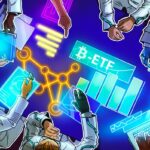Good morning. It’s been one week since Americans went to the polls and elected Donald Trump to be the next president. Since then, there’s a been a non-stop whirlwind of announcements and speculation, as the first contours of the administration’s members and potential policy moves come into view.
Naturally, this dominated the discussion as business leaders gathered in New York for the first day of Fortune Global Forum on Monday.
Are we moving into a more purposeful decoupling with China? Will the U.S. cut back its military funding to Ukraine? Are business execs shamelessly “AI washing?”
Questions abound, and the forecast calls for more to come —Alexei Oreskovic
Want to send thoughts or suggestions to Data Sheet? Drop a line here.
Signs of a possible LLM slowdown
So far, large language models have proved to be a highly scalable way of developing AI—throw more data and computing power at their training, and they improve at an impressive rate.
However, reports from The Information and Reuters suggest that LLMs’ luck may be running out, with OpenAI and other top labs noticing a slowing rate of improvement as they train the next generation of models. This may relate to dwindling supplies of fresh data.
The AI rivals have been changing their strategies accordingly, using more synthetic data, or data that is created artificially, while mimicking real data. They’re also working on new techniques that shift more of the improvements they make to the inference stage, where the model is being deployed rather than trained.
This could have implications for the economics and environmental impact of training, and perhaps it will take generative AI to positive new places.
But critics of the pure-LLM approach, like the cognitive scientist Gary Marcus, see this as vindication—a sign that other approaches are necessary if AI is to become reliably accurate. —David Meyer
South Korea scrambles to defend chipmakers from Trump
South Korea’s government wants to shield the country’s economically-crucial chipmakers from the incoming Trump administration.
The big fear is that, with the U.S. potentially slapping big tariffs on Chinese imports, Chinese chip exporters will slash their prices elsewhere, causing a painful knock-on effect on their Korean rivals.
So South Korea’s ruling party has proposed legislation that would relax labor laws for chipmakers, while also throwing subsidies at them. South Korea has so far opted for tax benefits instead of direct subsidies.
Now it’s over to South Korea’s main opposition party to assess the bill. Labor unions oppose the extension of working hours.
Samsung and SK Hynix, the two biggest Korean chipmakers, are reportedly also concerned about the future of their potential handouts under the U.S. CHIPS Act. Trump has said he would cancel the incentive package, which incentivizes onshoring of chip production, as he believes import tariffs would have the same effect of boosting U.S. manufacturing without cost to the federal government. —DM
Amazon’s new glasses
Your Amazon delivery driver may have the latest smart glasses before you do.
According to Reuters, the internet retail giant is developing new smart glasses to help its army of delivery drivers get packages to customer doorsteps more quickly.
A small embedded screen on the glasses will give delivery drivers “turn-by-turn” directions to navigate inside large apartment buildings, saving time on each delivery and freeing up hands. Photos snapped through the glasses could serve as proof of delivery.
Reuters notes that the glasses are still just an internal experiment, code named Amelia, that may never make it out of the lab. The battery needs to last longer, and Amazon needs to acquire the navigational data to provide drivers with directions inside apartment complexes.
“We are continuously innovating to create an even safer and better delivery experience for drivers,” an Amazon rep told Reuters, but said the company doesn’t comment on its product roadmap. —Fortune staff
Zoox rolls into San Francisco
San Franciscans are accustomed to the sight of self-driving Waymo cars, navigating city streets without anyone behind the steering wheel. Now SF residents will share the roads with vehicles that don’t even have steering wheels.
Zoox, an autonomous driving company owned by Amazon, said Monday that its distinctive, box-like vehicles have begun operating in certain parts of the city. The Zoox robotaxi, which look like a cross between a tiny shuttle bus and a gondola ski lift cabin, can transport 4 passengers, who sit across from each other, face-to-face (Fortune’s Jessica Matthews was invited to take a test ride in a Zoox in September).
The Zoox robotaxi in San Francisco will initially only be available for Zoox employees to ride. While the company didn’t provide a date for when the public in San Francisco will be able to hop in one of the buggies, it said it’s aiming to begin public trials in 2025 in parts of Las Vegas, where it is also testing the vehicles. —Fortune staff
FTX wants $1.8 billion clawback
FTX founder Sam Bankman Fried is in prison. But a battle is raging over the billions invested into the defunct crypto firm.
On Sunday, the FTX estate filed a lawsuit seeking to reclaim roughly $1.8 billion from one-time crypto rival firm Binance and its former CEO ChangPeng Zhao. The suit alleges that the money was “fraudulently” transferred by Bankman Fried in 2021.
The estate also cites tweets made by Zhao that it alleges led to the collapse of FTX saying they were “false, misleading, and fraudulent” and “maliciously calculated to destroy his rival…” according to the filing.
Binance denied the allegations in an emailed statement shared with Fortune saying, “The claims are meritless, and we will vigorously defend ourselves.” —Fortune staff
More data
—Apple will defend its App Store practices in a Chinese court. It could become the Chinese version of the Fortnite saga.
—Tencent will invest around $500 million in Indonesia by the end of the decade. It’s just announced its third data center there.
—Abu Dhabi’s sovereign wealth fund invests $1 billion into Qlik. The deal values the U.S. software firm at around $10 billion.
—Elon Musk’s Trump bet has paid off so well that Tesla is now worth more than most of the rest of the car industry combined. Friends get benefits.
—Bitcoin nears $90,000 as Trump crypto wave rolls on. The prospect of deregulation is exciting investors.










